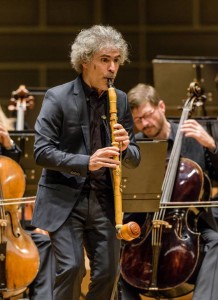This is a picture of Lorenzo Coppola playing his basset clarinet, or called “clarinet d’amour.” The instrument is similar to a normal clarinet but longer, which allows greater range of notes (4 octaves!) and the mute in the bell softens the sound.
The Freiburg Baroque Orchestra had traveled from Germany and they performed an All-Mozart program at Cornell. I had previously played baroque music with my flute in high school ensemble band, so I was pretty excited about the event. I was interested in how they would play Mozart pieces using baroque style instruments, but it was surprising to hear the similarity in the music even though different instruments were used. It was very impressive that the orchestra could play the whole program without a conductor, which suggests that they are always listening to each other to adjust the tempo and balance. After closely watching the musicians, I could tell that each of them were highly talented and had practiced together for a long time, from their seamless finger movements. They made the beautiful music seem so effortless, but I know that it takes a lifetime of perseverance to reach the level of perfection that they presented tonight. It was my first time seeing a live opera performance; I was actually not expecting an opera performance, because when I read the word “baritone” in the description, I immediately thought of the baritone instrument. However, the performances were spectacular and I was glad that they provided translations of the songs that I could follow and understand.
I had a lot of fun listening to Mozart music and seeing the different types of baroque style instruments. For example, the flute had a wooden body and the French horn did not have any keys so the musician constantly changed the tube length of the horn in order to play different notes. The concert was above and beyond of what I had expected and I hope there are similar opportunities in the future. Thank you to Sara for taking us there and encouraging us to meet and talk to each other!

